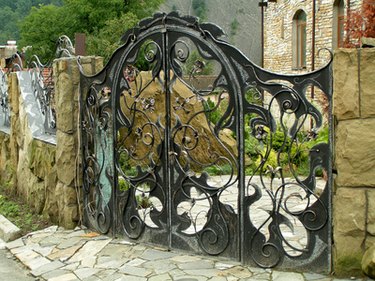Things You'll Need
Workbench mounted vise
Forming jigs
Vise grips
Tinted heat-resistant face shield
Leather apron
Welding gloves
Blacksmith tongs
Bending Tools
Propane torch
Oxyacetylene torch
Coal fire
Anvil
4-pound blacksmith hammer

Wrought iron has many uses both decorative and functional including railings, gates, benches, beds, curtain rods and arts and crafts. Wrought iron belongs to the ferrous family of metals with low carbon content and high melting temperature of 2,700 degrees Fahrenheit. Two methods of bending wrought iron are using forming tools or using heat. Depending on the degree of the bend, forming tools can leave bend marks at the stress points, making heat a better choice.
Cold Shaping
Step 1
Place the wrought iron rod or flat into a workbench-mounted vise and tighten the vice to hold the wrought iron firmly in place.
Video of the Day
Step 2
Secure a forming jig next to the wrought iron rod or flat. A forming jig is an attachment that wrought iron bends around to create shapes. Forms are available in many sizes and shapes to create virtually any contour. The tools are known as wrought iron forming jigs, wrought iron jig set bending tools and wrought iron benders.
Step 3
Grasp the free end of the wrought iron with vise grips and pull it around the forming jig to create a shape. Create twists by sliding a bending tool over the wrought iron and twisting the tool left or right. A twisting tool is a flat piece of metal with a slot cut through the middle that fits over the wrought iron.
Heat Shaping
Step 1
Wear a tinted, heat resistant face shield, leather apron and welding gloves.
Step 2
Determine the point on the wrought iron rod for bending and shaping.
Step 3
Hold wrought iron with blacksmith tongs and apply heat to the bending point with a propane torch, oxyacetylene torch or intense coal fire.
Step 4
Allow the wrought iron to heat until it glows a bright orange.
Step 5
Place the wrought iron on an anvil and hit the unheated end with a 4-pound blacksmith hammer to bend angles and turns. Place specialized forms over the anvil to create other shapes and bends when striking hot wrought iron with a blacksmith hammer.
Warning
Work in a well ventilated, free of combustibles area when heating wrought iron. Do not handle hot wrought iron with bare hands, as severe burns will occur.
Video of the Day